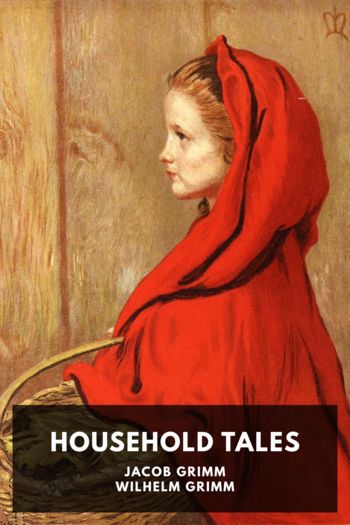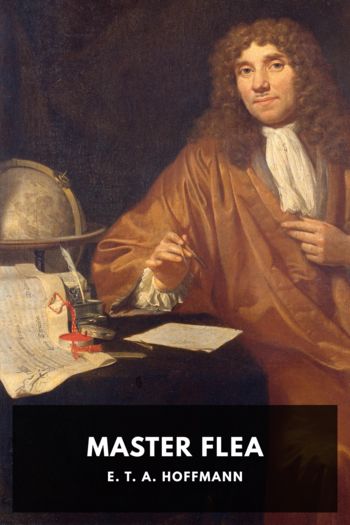Household Tales - Jacob Grimm (read me a book .txt) 📗

- Author: Jacob Grimm
Book online «Household Tales - Jacob Grimm (read me a book .txt) 📗». Author Jacob Grimm
“My word!” said the peasant. “How I’d like to know if that’s true!”
“Come, then,” said the gossip, “I’ll tell you what to do. Get into my egg-basket and I will carry you home, and then you will see for yourself.” So that was settled, and the gossip put the peasant into his egg-basket and carried him home.
When they got to the house, hurrah! but all was going merry there! The woman had already had nearly everything killed that was in the farmyard, and had made pancakes, and the parson was there, and had brought his fiddle with him. The gossip knocked at the door, and woman asked who was there. “It is I, gossip,” said the egg-merchant, “give me shelter this night; I have not sold my eggs at the market, so now I have to carry them home again, and they are so heavy that I shall never be able to do it, for it is dark already.”
“Indeed, my friend,” said the woman, “thou comest at a very inconvenient time for me, but as thou art here it can’t be helped, come in, and take a seat there on the bench by the stove.” Then she placed the gossip and the basket which he carried on his back on the bench by the stove.
The parson, however, and the woman, were as merry as possible. At length the parson said, “Listen, my dear friend, thou canst sing beautifully; sing something to me.”
“Oh,” said the woman, “I cannot sing now, in my young days indeed I could sing well enough, but that’s all over now.”
“Come,” said the parson once more, “do sing some little song.”
On that the woman began and sang,
“I’ve sent my husband away from me
To the Göckerli hill in Italy.”
Thereupon the parson sang,
“I wish ’twas a year before he came back,
I’d never ask him for the laurel-leaf sack.”
Hallelujah.
Then the gossip who was in the background began to sing (but I ought to tell you the peasant was called Hildebrand), so the gossip sang,
“What art thou doing, my Hildebrand dear,
There on the bench by the stove so near?”
Hallelujah.
And then the peasant sang from his basket,
“All singing I ever shall hate from this day,
And here in this basket no longer I’ll stay.”
Hallelujah.
And he got out of the basket, and cudgelled the parson out of the house.
The Three Little BirdsAbout a thousand or more years ago, there were in this country nothing but small kings, and one of them who lived on the Keuterberg was very fond of hunting. Once on a time when he was riding forth from his castle with his huntsmen, three girls were watching their cows upon the mountain, and when they saw the King with all his followers, the eldest girl pointed to him, and called to the two other girls, “Hilloa! hilloa! If I do not get that one, I will have none.”
Then the second girl answered from the other side of the hill, and pointed to the one who was on the King’s right hand, “Hilloa! hilloa! If I do not get that one, I will have none.”
And then the youngest pointed to the one who was on the left hand, and cried, “Hilloa! hilloa! If I do not get him, I will have no one.” These, however, were the two ministers.
The King heard all this, and when he had come back from the chase, he caused the three girls to be brought to him, and asked them what they had said yesterday on the mountain. This they would not tell him, so the King asked the eldest if she really would take him for her husband? Then she said, “Yes,” and the two ministers married the two sisters, for they were all three fair and beautiful of face, especially the Queen, who had hair like flax. But the two sisters had no children, and once when the King was obliged to go from home he invited them to come to the Queen in order to cheer her, for she was about to bear a child. She had a little boy who brought a bright red star into the world with him. Then the two sisters said to each other that they would throw the beautiful boy into the water. When they had thrown him in (I believe it was into the Weser) a little bird flew up into the air, which sang,
“To thy death art thou sped,
Until God’s word be said.
In the white lily bloom,
Brave boy, is thy tomb.”
When the two heard that, they were frightened to death, and ran away in great haste. When the King came home they told him that the Queen had been delivered of a dog. Then the King said, “What God does, is well done!” But a fisherman who dwelt near the water fished the little boy out again while he was still alive, and as his wife had no children, they reared him. When a year had gone by, the King again went away, and the Queen had another little boy, whom the false sisters likewise took and threw into the water. Then up flew a little bird again and sang,
“To thy death art thou sped,
Until God’s word be said.
In the white lily bloom,
Brave boy, is thy tomb.”
And when the King came back, they told him that the Queen had once more given birth to a dog, and he again said, “What God does, is well done.” The fisherman, however, fished this one also out of the water, and reared him.
Then the King again journeyed forth, and the Queen had a little girl, whom also the false sisters threw into the water. Then again a little bird flew up on high and sang,
“To thy





Comments (0)